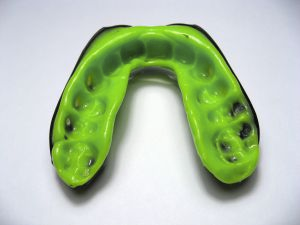
Mandatory fitted mouthguards used for contact sports have improved sports at all levels, and for all ages. According to the Australian Dental Association (ADA), over-the-counter mouthguards do not provide the maximum level of protection necessary to avoid dental injuries. Whereas, custom-fitted mouthguards allow the accurate assessment of the individual’s mouth to gain a better fit. Custom-fitted mouthguards also help oxygen flow and unrestricted breathing during activities.
There are generally four (4) types of mouthguards popularly used today:
• Over-the-counter (non-fitted),
• “Boil-and-Bite” (heated and mouth-formed),
• Cut-off (covers front teeth only), and
• Custom-fitted (impressions made of the upper dental arch).
Other Purposes
Sports mouthguards are intended to protect the teeth, lips, gums, and arches. Custom mouthguards are also used in tooth bleaching and it has been extensively studied that not only do fitted mouthguards protect teeth from oral injury, but they also play a role in reducing concussive force impacts, via the mouth and jaw, to the brain.
Additionally, occlusal splints are custom-fitted mouthguards used to protect tooth and restored surfaces. Medically, they manage jaw (mandibular) dysfunction and stabilize jaw joints occulusion, as well as reduce TMD (temporomandibular joint dysfunction - extreme jaw pain and discomfort).
Those prone to nocturnal teeth clenching, teeth grinding, or inner cheek biting may also find occlusal splints helpful.
Many custom occlusal splints for children are partial coverage plates made of soft, flexible acrylic, vinyl, or light composite materials. They are not made for their durability or intended to last a long time due to children’s rapid changes in growth.
Processes
Unlike boil-and-bite mouthguards made of thermoplastic material that softens when heated and is fashioned in the mouth to the user’s bite impression, custom-fitted mouthguards are modeled from a dental putty cast impression, or using dental alginate in the dentist’s office. The impression is professionally made into a mouthguard at a lab.
No two impressions are alike and it is assured the completed professionally formed mouthguard will fit properly and not loosen, rub, or shift inside the mouth over time and wear. Customized adjustments such as posterior thickness, for comfort, or alterations for easier speaking, may be made as necessary or upon request.
Pressure laminated produced mouthguards are superior to vacuum formed ones. Vacuum formed custom mouthguards offer more protection than boil-and-bite guards. However, they are single layer and do not fit as securely in the mouth.
Custom made pressure laminated mouthguards are multi-layered and provide more protection and comfort, as well as a better fit.
It is important not only to have your mouthguard initially custom-fitted, but also to have it consistently checked to ensure it is fitting properly and is providing maximum protection.
Greg Sharman is your Dental Prosthetist in Franston offering custom-fit mouthguards and services. Other products and services Dr. Sharman provides, include:
• Complete and Partial Dentures,
• Implant Retained Dentures,
• Denture Relines and Remodels,
• Denture Repairs while you wait, and
• Adjustments and Cleaning.
We are located at 1b Wells Street in Frankston. For more information on products and services and to schedule an appointment, visit us at http://www.denturesfrankston.com.au.
There are generally four (4) types of mouthguards popularly used today:
• Over-the-counter (non-fitted),
• “Boil-and-Bite” (heated and mouth-formed),
• Cut-off (covers front teeth only), and
• Custom-fitted (impressions made of the upper dental arch).
Other Purposes
Sports mouthguards are intended to protect the teeth, lips, gums, and arches. Custom mouthguards are also used in tooth bleaching and it has been extensively studied that not only do fitted mouthguards protect teeth from oral injury, but they also play a role in reducing concussive force impacts, via the mouth and jaw, to the brain.
Additionally, occlusal splints are custom-fitted mouthguards used to protect tooth and restored surfaces. Medically, they manage jaw (mandibular) dysfunction and stabilize jaw joints occulusion, as well as reduce TMD (temporomandibular joint dysfunction - extreme jaw pain and discomfort).
Those prone to nocturnal teeth clenching, teeth grinding, or inner cheek biting may also find occlusal splints helpful.
Many custom occlusal splints for children are partial coverage plates made of soft, flexible acrylic, vinyl, or light composite materials. They are not made for their durability or intended to last a long time due to children’s rapid changes in growth.
Processes
Unlike boil-and-bite mouthguards made of thermoplastic material that softens when heated and is fashioned in the mouth to the user’s bite impression, custom-fitted mouthguards are modeled from a dental putty cast impression, or using dental alginate in the dentist’s office. The impression is professionally made into a mouthguard at a lab.
No two impressions are alike and it is assured the completed professionally formed mouthguard will fit properly and not loosen, rub, or shift inside the mouth over time and wear. Customized adjustments such as posterior thickness, for comfort, or alterations for easier speaking, may be made as necessary or upon request.
Pressure laminated produced mouthguards are superior to vacuum formed ones. Vacuum formed custom mouthguards offer more protection than boil-and-bite guards. However, they are single layer and do not fit as securely in the mouth.
Custom made pressure laminated mouthguards are multi-layered and provide more protection and comfort, as well as a better fit.
It is important not only to have your mouthguard initially custom-fitted, but also to have it consistently checked to ensure it is fitting properly and is providing maximum protection.
Greg Sharman is your Dental Prosthetist in Franston offering custom-fit mouthguards and services. Other products and services Dr. Sharman provides, include:
• Complete and Partial Dentures,
• Implant Retained Dentures,
• Denture Relines and Remodels,
• Denture Repairs while you wait, and
• Adjustments and Cleaning.
We are located at 1b Wells Street in Frankston. For more information on products and services and to schedule an appointment, visit us at http://www.denturesfrankston.com.au.

